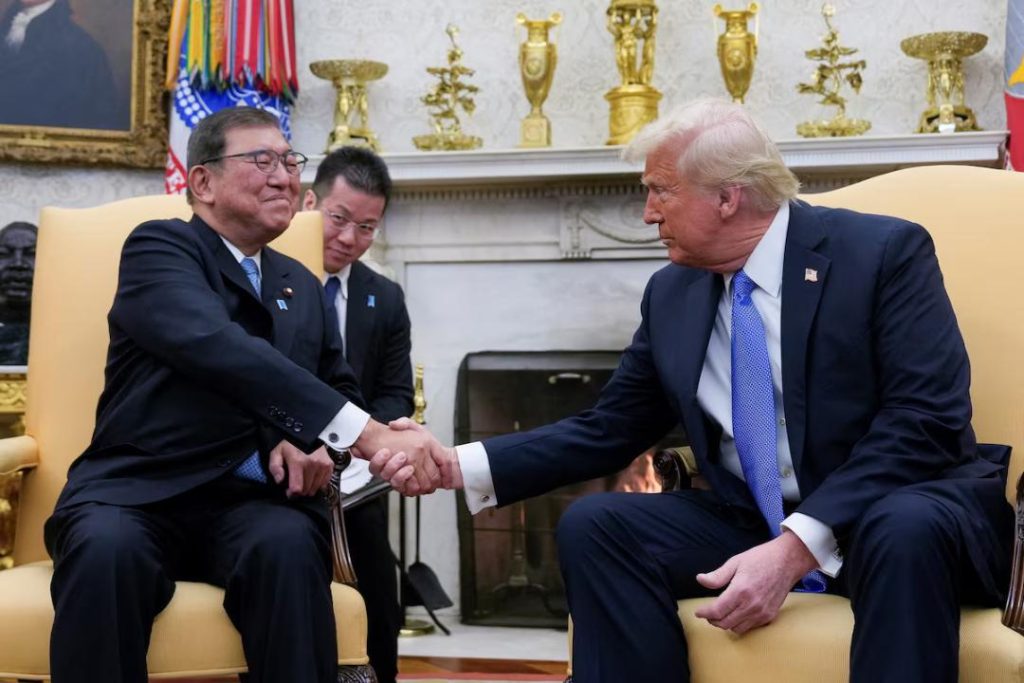
Japan Raises Concern over US Trade Deal Inconsistency: PM Ishiba
In a recent statement, Japanese Prime Minister Shigeru Ishiba expressed “grave concern” over the inconsistency in the US trade deal with Japan. Ishiba stated that Japan will not cancel its 2019 trade deal with the US, but he emphasized the need for a clear understanding of the terms and conditions of the agreement.
The concern arises from the recent decision by US President Donald Trump to impose a 25% tariff on car imports from Japan. This move has sparked controversy, as it contradicts the assurances given by the US to Japan during the negotiations for the 2019 trade deal.
In 2019, former Japanese Prime Minister Shinzo Abe received assurances from the US that national security tariffs would not be imposed on Japanese car imports. However, Trump’s latest move has raised questions about the credibility of these assurances.
Ishiba’s statement came after Japan’s top trade negotiator, Toshimitsu Motegi, visited the US last week for trade talks. Motegi’s visit aimed to resolve the ongoing trade disputes between the two countries, but the outcome was unclear.
The Japanese government has consistently emphasized the importance of maintaining a fair and reliable trade relationship with the US. Ishiba’s statement reflects this commitment, as he emphasized the need for clarity and consistency in the trade deal.
In recent years, the trade relationship between Japan and the US has been marked by tensions and disagreements. The US has imposed tariffs on Japanese steel and aluminum, citing national security concerns. Japan has retaliated by imposing tariffs on US goods, including beef and pork.
The current trade dispute between the two countries is centered on the issue of car imports. The US has long sought to increase its exports to Japan, particularly in the automotive sector. However, Japan has been slow to open up its market to US carmakers, citing concerns about competition and market share.
The 25% tariff imposed by Trump on Japanese car imports has further complicated the situation. Japanese automakers have expressed concern about the impact of the tariff on their business operations and sales in the US market.
In response to the tariff, Japan has threatened to impose retaliatory measures, including tariffs on US goods such as beef and pork. The Japanese government has also sought to negotiate with the US to resolve the issue, but so far, no agreement has been reached.
The trade dispute between Japan and the US is not limited to the automotive sector. The two countries have ongoing disputes in areas such as agriculture, technology, and intellectual property.
The US has long sought to increase its exports to Japan, particularly in the agricultural sector. However, Japan has been slow to open up its market to US farmers, citing concerns about competition and market share.
The technology sector is another area of contention between the two countries. The US has accused Japan of unfairly restricting the use of US technology in Japan. Japan has denied these allegations, but the dispute remains unresolved.
Intellectual property is another area of concern for the US. The US has accused Japan of not doing enough to protect US intellectual property rights in Japan. Japan has responded by saying that it is committed to protecting intellectual property rights, but more needs to be done.
In conclusion, the trade deal between Japan and the US is facing significant challenges. The inconsistent application of tariffs by the US has raised concerns about the reliability of the agreement. Japan has expressed grave concern over the situation and has sought to negotiate with the US to resolve the issue.
The trade dispute between Japan and the US is complex and multifaceted, involving issues such as car imports, agriculture, technology, and intellectual property. The two countries must work together to resolve these disputes and maintain a fair and reliable trade relationship.
References:



